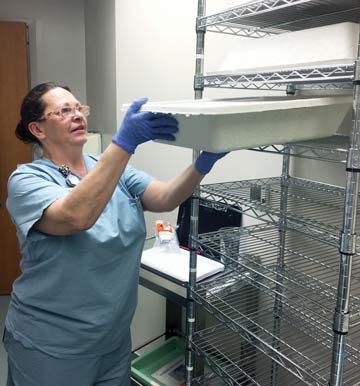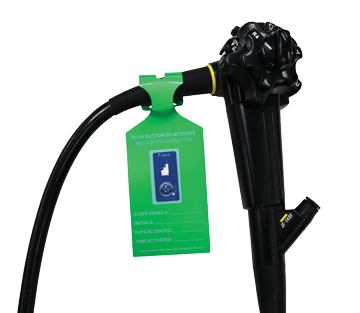How long can an endoscope hang in storage before you have to reprocess it again? There's no definitive answer, but 7 days is the consensus storage interval based on research and expert recommendations. Our facility's leaders agreed that 7 days is an acceptable limit. We tag each scope with the date that we hang it in our cabinet so staff know at a glance when 7 days have passed (see "How Long Have Your Scopes Been Hanging?" on page 72).
Barcode scanning is an effective, albeit more expensive, way to track storage interval, but the technology is still prone to human error — a tech must scan the scope when hanging it in a cabinet to create a digital record of the storage starting date. If you want to automate the entire process, some newer storage cabinets come with integrated RFID sensors that scan and timestamp RFID-enabled endoscopes.
We based our 7-day cutoff on the Society of Gastroenterology Nurses and Associates' recommendation and the oft-cited 2015 review of endoscope storage time studies (osmag.net/EZcb9D) that suggests you don't need to reprocess an "effectively reprocessed and appropriately stored" scope if you use it within a week.
The review showed extremely low bioburden contamination rates and that pathogens rarely formed in endoscope channels within a week of disinfection, says study co-author Marilee Schmelzer, PhD, RN, CGRN, who recently retired from her teaching position at the University of Texas at Arlington. "But," says Dr. Schmelzer, pausing for emphasis, "that's only if the scopes are properly disinfected and stored correctly."
Easier said than done. Conduct occasional spot checks of microbial growth in stored scope channels to determine if your safe storage timeframe is adequate, says Dr. Schmelzer. However, ATP and DNA testing are too expensive and too time-consuming for routine use, she says.
For now, focus on setting your own storage interval. Assign a quality control team to review current literature and establish a storage time limit that makes sense for your scope inventory and case load, says study co-author Glenda Daniels, PhD, MS, BSN, an associate professor of nursing at Texas Christian University in Fort Worth.
"Once you establish the policy, make sure it's strictly enforced," says Dr. Daniels. "You can get in trouble if a patient is infected and your staff hasn't followed your storage policy."
.svg?sfvrsn=be606e78_3)


.svg?sfvrsn=56b2f850_5)